
Sir Robert Laird Borden was a Canadian lawyer and politician who served as the eighth prime minister of Canada from 1911 to 1920. He is best known for his leadership of Canada during World War I.

The 1921 Canadian federal election was held on December 6,1921,to elect members of the House of Commons of Canada of the 14th Parliament of Canada. The Union government that had governed Canada through the First World War was defeated,and replaced by a Liberal government under the young leader William Lyon Mackenzie King. A new third party,the Progressive Party,won the second most seats in the election.

The Conservative Party of Canada has gone by a variety of names over the years since Canadian Confederation. Initially known as the "Liberal-Conservative Party",it dropped "Liberal" from its name in 1873,although many of its candidates continued to use this name.

Harry Corwin Nixon was a Canadian politician and briefly the 13th premier of Ontario in 1943. He is both the longest-serving member in the history of the Ontario legislature and the shortest-serving premier of Ontario.
The Unionist Party was a centre-right political party in Canada,composed primarily of former members of the Conservative party with some individual Liberal Members of Parliament. It was formed in 1917 by MPs who supported the "Union government" formed by Sir Robert Borden during the First World War,who formed the government through the final years of the war,and was a proponent of conscription. It was opposed by the remaining Liberal MPs,who sat as the official opposition.
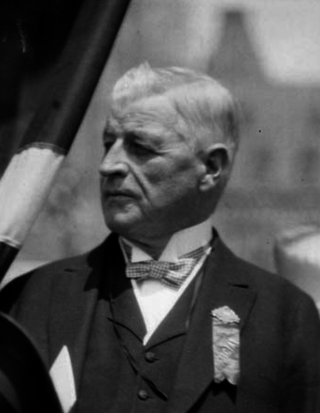
Hugh Guthrie,was a Canadian lawyer and politician who served as a minister in the governments of Sir Robert Borden,Arthur Meighen and R. B. Bennett.
The National Liberal and Conservative Party was the name adopted by the Conservative Party of Canada in 1920 after the end of the Unionist government of Robert Borden.
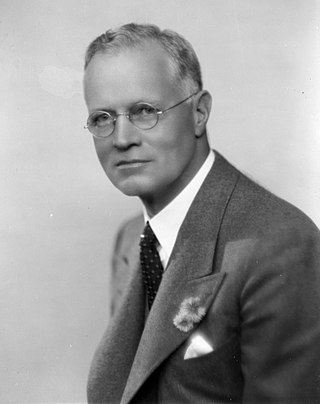
Robert James Manion was a Canadian politician who led the Conservative Party of Canada from 1938 to 1940. Prior to his leadership of the party,he served in Prime Minister Arthur Meighen and R.B. Bennett's cabinets.
Liberal–Unionists were supporters of the Liberal Party of Canada who,as a result of the Conscription Crisis of 1917 rejected Sir Wilfrid Laurier's leadership and supported the coalition Unionist government of Sir Robert Borden.

Newton Wesley Rowell,was a Canadian lawyer,politician and judge,as well as a lay leader in the Methodist Church. Rowell led the Ontario Liberal Party from 1911 to 1917 and put forward a platform advocating temperance. Rowell's Liberals failed to oppose the Whitney government's passage of Regulation 17 which restricted the teaching of the French language in schools and alienated the province's French-Canadian minority.
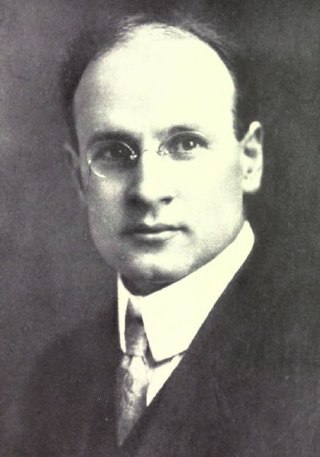
Henry Herbert Stevens,was a Canadian politician and businessman. A member of R. B. Bennett's cabinet,he split with the Conservative Prime Minister to found the Reconstruction Party of Canada.
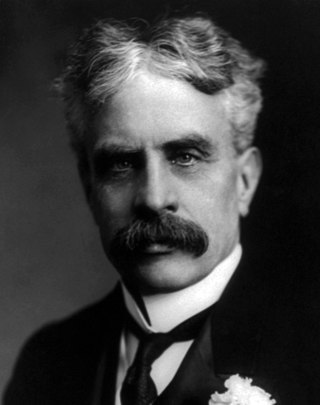
The 1917 Canadian federal election was held on December 17,1917,to elect members of the House of Commons of Canada of the 13th Parliament of Canada. Described by historian Michael Bliss as the "most bitter election in Canadian history",it was fought mainly over the issue of conscription. The election resulted in Prime Minister Sir Robert Borden's Unionist government elected with a strong majority and the largest percentage of the popular vote for any party in Canadian history.

Joseph William Noseworthy was a Canadian politician. He was a Co-operative Commonwealth Federation member of the federal parliament from 1942 to 1945 and again from 1949 to 1956. He died in office on March 30,1956.
Robert Cruise was a Canadian Member of Parliament for Dauphin,Manitoba.

Arthur Meighen was a Canadian lawyer and politician who served as the ninth prime minister of Canada from 1920 to 1921 and from June to September 1926. He led the Conservative Party from 1920 to 1926 and from 1941 to 1942.
Wilfrid Garfield Case also known as W. Garfield Case,,was a Canadian politician who served as a Progressive Conservative Member of Parliament and Mayor of Owen Sound,Ontario. He is best known for his upset victory over Defence Minister General Andrew McNaughton in the Grey North federal by-election held on February 5,1945.
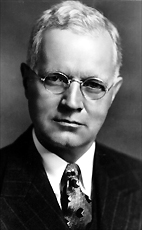
A National Conservative leadership convention began on July 5,1938,culminating in a leadership ballot on July 7. The Conservative Party of Canada chose Robert James Manion to succeed former Prime Minister R. B. Bennett as party leader.

A Conservative leadership convention was held on October 12,1927 at the Winnipeg Amphitheatre in Winnipeg,Manitoba. The convention was held to choose a new leader of the Conservative Party to choose a successor to former Prime Minister of Canada Arthur Meighen who had led the party since 1920. This was the first time the Conservatives used a leadership convention to choose a leader. Previous leaders had been chosen by the party's caucus,the previous leader,or by the Governor General of Canada designating an individual to form a government after his predecessor's death or resignation.

This article is the Electoral history of Robert Borden,the eighth Prime Minister of Canada (1911-1920).

The article is the Electoral history of Arthur Meighen,the ninth Prime Minister of Canada.














